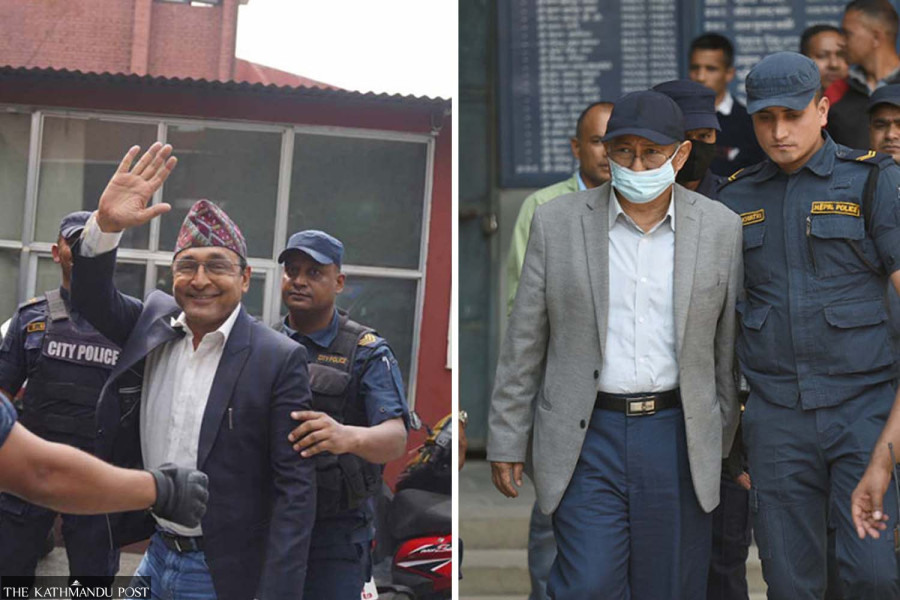National
Two judges split on ex-minister Khand’s judicial custody
High Court upholds former deputy PM Rayamajhi’s custody. A third judge will decide on Khand, a former home minister.
Prithvi Man Shrestha
The Patan High Court on Friday upheld the June 16 decision of the Kathmandu District Court to send nine people including former deputy prime minister Top Bahadur Rayamajhi to judicial custody in the fake Bhutanese refugee case.
A joint bench of judges Janak Pandey and Prakash Kharel issued the order to release 10 others accused—six on bail and four without.
But there will be a separate verdict in the case of former home minister Bal Krishna Khand as the two judges were divided on whether to give continuity to his judicial custody or release him on bail.
Besides Rayamajhi, the bench refused to release the then home minister Ram Bahadur Thapa’s adviser Indrajit Rai, former home secretary Tek Narayan Pandey, Keshav Prasad Dulal, and former Nepali Congress lawmaker Aang Tawa Sherpa. Also, middlemen involved in the case—Sanu Bhandari, Sandesh Sharma, Govinda Kumar Chaudhary and Sagar Rai—were also denied bail.
The court ordered authorities to release Sandeep Rayamajhi, son of former deputy prime minister Rayamajhi, on a bail of Rs3 million, and Bhutanese refugee leader Tek Nath Rizal, Ram Sharan KC and Hari Bhakta Maharjan on bail of Rs1.5 million each.
Likewise, bail amounts for Narendra KC and Shamsher Miya have been fixed at Rs1 million each.
On the other hand, Laxmi Maharjan, Ashish Budhathoki, Tanka Kumar Gurung and Keshav Tuladhar have been released without bail.
Earlier, on June 16, the District Court Kathmandu had released Gurung and Maharjan on bails of Rs1 million and Rs500,000, respectively. But they had moved the high court challenging the verdict.
“In Khand’s case, Judge Pandey advocated for his release for Rs3 million in bail, while Kharel opted for imprisoning him,” said Tirtha Raj Bhattarai, the high court spokesman. “The case will now go to the bench of a third judge who will make a decision on Khand.”
On June 16, the Kathmandu District Court sent 16 people including former ministers Top Bahadur Rayamajhi and Bal Krishna Khand to judicial custody after a hearing in a fake Bhutanese refugee scam.
The district court had passed the order to send 16 of the 18 defendants in the refugee scam to judicial custody.
On May 24, the District Attorney Office Kathmandu had filed criminal cases at the District Court Kathmandu against 30 individuals accused in the scam.
They have been charged with four types of crimes—treason, organised crime, fraud and forgery. The accused have been charge-sheeted for collecting Rs288.17 million from 115 victims—ranging from Rs150,000 to Rs4.8 million each—by promising to send them to the US as Bhutanese refugees.
Officials say that it is rare for politicians to face treason charges in such cases. Treason is an act of offence against the state.
“Politicians might have faced treason charges during the conflict period, but rarely in normal times,” Achyut Neupane, chief of the Kathmandu District Attorney’s Office, told the Post in late May.
Even though the United Nations High Commissioner for Refugees (UNHCR) had closed third-country resettlement of Bhutanese refugees in December 2016 after most refugees left for Western countries, the government had later resumed the verification process.
In an undated letter attached to the chargesheet, the UNHCR said, “The resettlement programme concluded in 2016 and it will not resume,” the UNHCR letter, which appears to be a public notice, stated.
Experts said that such a process was initiated with a mala fide intent. “We cannot assume that the state was unaware of the impossibility of a third country resettlement of Bhutanese refugees left behind in Nepal,” Neupane, chief of the Kathmandu District Attorney’s Office, told the Post in late May. “A mala fide intent of some state actors who colluded with the racketeers is clearly visible here.”
In 2019, the then government led by KP Sharma Oli had formed a task force under then joint secretary Bal Krishna Panthi to recommend ways to manage Bhutanese refugees who remained in Nepal after the ending of the third-country resettlement programme.
The taskforce submitted a report by including 429 Bhutanese refugees who had been left behind. Later, the racketeers, in collusion with some top officials, prepared another report and added hundreds of other people to the list of refugees.
As per the charge sheet, former deputy prime minister Rayamajhi is the mastermind of the refugee scam. He had played a key role in causing the disappearance of the actual report of the Panthi task force and replacing it with a fake one.
The then home secretary Pandey had stolen the report from the ministry and replaced it with a fake. Malafide intent is also evident from the fact that the racketeers had begun collecting money from those aspiring to migrate as Bhutanese refugees before the formation of the taskforce, as per the statements of the defendants in the charge sheet.
Sanu Bhandari, a defendant in the case, who claimed to be a victim of false promises, said in his statement that he had paid more than Rs6.96 million to the Rayamajhis—father and son—between April 17, 2017 and April 13, 2018 in instalments as they promised to settle him and his family members in the US as Bhutanese refugees.
Scams related to fake Bhutanese refugees, gold smuggling and Lalita Niwas land, have made headlines in the recent months, pointing to pervasive corruption in the country.




 10.12°C Kathmandu
10.12°C Kathmandu















